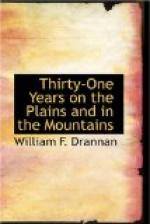In a conversation that evening with the Indians, they told me their business out there, which was to keep the Sioux Indians off of their hunting ground.
The Sioux and they were on friendly terms, but sometimes the Sioux would steal over on their hunting ground. They proposed to accompany us through the dangerous part of the country.
The morning following I told the men in the train of the generous proposition which the Indians had made me, and told them if they would furnish the Indians with bread they would keep them in meat. I also told them that we were now in the most dangerous part of the Sioux country, and that as long as those Indians were with us we were in no danger whatever from the fact that when the Sioux saw those Indians with us we were supposed to be their friends, and they dare not trouble us in the least.
This, however, was more than agreeable to the entire train, relieving the scouts of their duty, also the night guards. I made arrangements with the Indians to travel three days, and we then pulled out. Just when we were almost ready to start, one young lady in the crowd said to me; “Captain, I want to ask you one question, and will you tell me the truth?” I said: “Most assuredly I will.” She said: “I want to know whether it was true that when you visited those Indians they always killed a dog and ate the meat?”
I told her it was true as gospel, and said we always considered dog meat the finest in the land, and only the chief and his most intimate friends were able to afford dog meat. She said she was astonished to hear me talk in such a manner. She said: “The most laughable part of the proceedings the evening before was the action of the darkey cook, Bab, who stood away back in the outer edge of the crowd when you and those Indians were dancing. You could have knocked his eyes off with a frying-pan and not have touched his face.”
All went well. The Indians traveled with us three days as they had agreed to, which brought us to the head of Bitter creek. We killed a few buffalo all along the way, and when the Indians were ready to leave us they had killed all the meat that the train could take care of.
This being as far as they had agreed to accompany us, they were to start back the following morning and that night we had another peace dance. The Indians invited all in the train to participate in the dance, but none would take a part; so they and myself had the dancing to ourselves again The next morning when they were ready to leave us I told the people in the train to all come outside of the corral, both old and young, and form in line so those Indians could shake hands with all of them, telling them that they had done us a great favor in escorting us through the dangerous part of the country, and that this shaking hands they considered a great token of friendship.
This request was complied with, and the Indians all passed down the line of people, shaking hands with each one. After they were done shaking hands with all the train they all came and shook hands with me, mounted their ponies, and rode away as fast as their horses could run.




